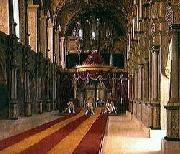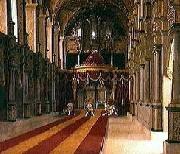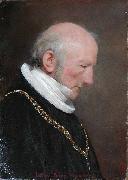Johan Vilhelm Gertner El petróleo que Pinta la ReproducciónAll Johan Vilhelm Gertner Oil Paintings(10 March 1818 - 28 March 1871) was a Danish painter, best known for his portraiture. One of the last students of Christoffer Wilhelm Eckersberg, who was known as the father of the Golden Age of Danish Painting, Gertner belonged to the tail end of the Golden Age, a period during which Danish art moved towards a more realistic style, relying on inspiration both from French Realism and emerging photographic techniques. Gertner was born on 10 March 1818 to a craftsman at the Holmen naval base. He attended the Royal Danish Academy of Fine Arts from 1831 to 1837 where he was one of Christoffer Wilhelm Eckersberg, known as the farther of Goldn Age of Danish Painting. Eckersberg taught him a naturalistic approach to painting, but Gertner went much further with inspiration from French art and the emerging techniques of photography. His virtuosity in producing almost photographically precise portraits impressed many; in particular, his ability to reproduce textures and materials e crisp silk dresses, lustrous medals and jewellery, dark mahogany furniture, silky wallpapers, and soft carpets e won him much acclaim. Others, such as the influential art historian and critic Niels Lauritz Høyen, who opposed any foreign influence on Danish painting, disapproved of his style, preferring more sincere and sensitive portrayals. He was a professor at the Academy from 1858. |
|||

|
|||
|
|
|||
|
||||||||
| Johan Vilhelm Gertner (10 March 1818 - 28 March 1871) was a Danish painter, best known for his portraiture. One of the last students of Christoffer Wilhelm Eckersberg, who was known as the father of the Golden Age of Danish Painting, Gertner belonged to the tail end of the Golden Age, a period during which Danish art moved towards a more realistic style, relying on inspiration both from French Realism and emerging photographic techniques. Gertner was born on 10 March 1818 to a craftsman at the Holmen naval base. He attended the Royal Danish Academy of Fine Arts from 1831 to 1837 where he was one of Christoffer Wilhelm Eckersberg, known as the farther of Goldn Age of Danish Painting. Eckersberg taught him a naturalistic approach to painting, but Gertner went much further with inspiration from French art and the emerging techniques of photography. His virtuosity in producing almost photographically precise portraits impressed many; in particular, his ability to reproduce textures and materials e crisp silk dresses, lustrous medals and jewellery, dark mahogany furniture, silky wallpapers, and soft carpets e won him much acclaim. Others, such as the influential art historian and critic Niels Lauritz Høyen, who opposed any foreign influence on Danish painting, disapproved of his style, preferring more sincere and sensitive portrayals. He was a professor at the Academy from 1858. |
||||||||
|
|
||||||||
| Pintura identificación:: 83651 Anointment of King Christian VIII and Queen Caroline Amalia in Frederiksborg Castle Church Anointment of King Christian VIII and Queen Caroline Amalia in Frederiksborg Castle Church, 28 June, 1840. Oil on canvas. cjr |
||||||||
|
|
||||||||
| Pintura identificación:: 87515 Anointment of King Christian VIII Oil on canvas. The Rosenborg Museum. Date 1852(1852) cyf |
||||||||
|
|
||||||||
| Pintura identificación:: 97185 Jacob Peter Mynster 1842(1842) Medium Oil cyf |
||||||||
|
|
||||||||
|
| ARTISTA PREVIO PROXIMO ARTISTA | |||||||
|
|
||||||||
|
Johan Vilhelm Gertner (10 March 1818 - 28 March 1871) was a Danish painter, best known for his portraiture. One of the last students of Christoffer Wilhelm Eckersberg, who was known as the father of the Golden Age of Danish Painting, Gertner belonged to the tail end of the Golden Age, a period during which Danish art moved towards a more realistic style, relying on inspiration both from French Realism and emerging photographic techniques. Gertner was born on 10 March 1818 to a craftsman at the Holmen naval base. He attended the Royal Danish Academy of Fine Arts from 1831 to 1837 where he was one of Christoffer Wilhelm Eckersberg, known as the farther of Goldn Age of Danish Painting. Eckersberg taught him a naturalistic approach to painting, but Gertner went much further with inspiration from French art and the emerging techniques of photography. His virtuosity in producing almost photographically precise portraits impressed many; in particular, his ability to reproduce textures and materials e crisp silk dresses, lustrous medals and jewellery, dark mahogany furniture, silky wallpapers, and soft carpets e won him much acclaim. Others, such as the influential art historian and critic Niels Lauritz Høyen, who opposed any foreign influence on Danish painting, disapproved of his style, preferring more sincere and sensitive portrayals. He was a professor at the Academy from 1858. |
||||||||
|
|
||||||||
|
CONTACTE EEUU |








